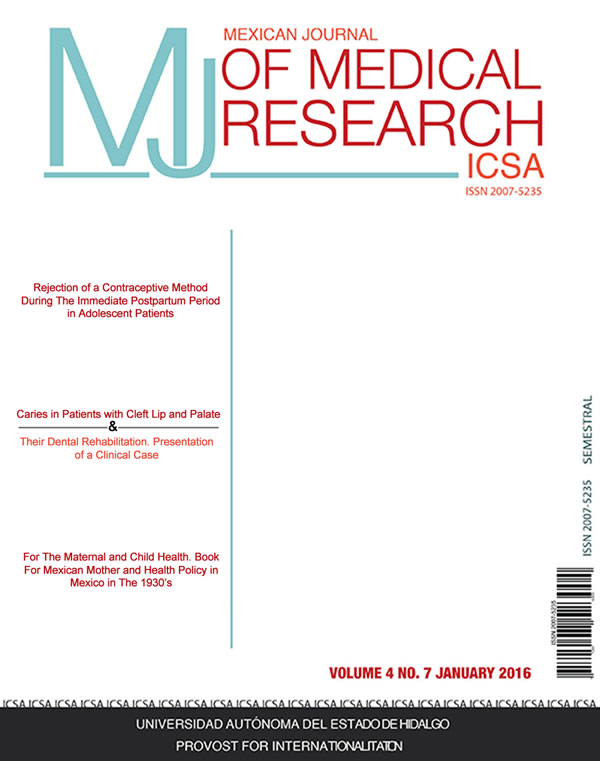Rejection of a contraceptive method during the immediate postpartum period in adolescent patients
DOI:
https://doi.org/10.29057/mjmr.v4i7.1850Keywords:
Rejection of Contraceptive Method; Adolescents; Immediate postpartum period; PregnancyAbstract
Adolescents generally have little information on the correct use of contraception and fertility, increasing the risk of pregnancy. The aim of this study was to determine why adolescents do not accept contraception during the immediate postpartum period. Adolescent patients included presented 12 to 19 years old, who signed the letter of informed consent, they were in immediate postpartum, post-abortion (implemented curettage, manual vacuum aspiration) or pot-cesarean section and who did not accept the use of a contraceptive method. A total of 148 patients with a mean ± SEM age of 17.3 ± 1.3 years were included. Only 107 (90.7%) of the patients had prenatal care, and only 77 (72%) of the patients were guided about the contraceptive methods that could be used in the immediate postpartum period. The 3 main reasons to reject contraception were: ignorance about contraception that she can use (n = 26; 22%), the couple will use birth control (n = 16; 13.6%) and she has no partner (n = 12; 10.2%). In conclusion, we observed that most teens do not use contraception, mainly due to lack of information or by leaving the responsibility to their partner.
Downloads
References
2. Vallejo Barón J. Embarazo en adolescentes: complicaciones. Rev Méd Costa Rica Centroam 2013; LXX(605):65-69.
3. Zamora-Lares AN, Panduro Barón JG, Pérez Molina JJ. Embarazo en adolescentes y sus complicaciones materno- perinatales. Rev Méd MD 2013; 4(4):234-238.
4. León P, Minassian M, Borgoño R. Embarazo adolescente. Rev Ped Elect 2008; 5(1):B42-51.
5. Nolazco ML, Rodríguez LY. Morbilidad materna en gestantes adolescentes. Rev Posg VIa Cát Med 2006; 156:13-18.
6. Juárez F, Palma JL, Singh Susheela. Las necesidades de salud sexual y reproductiva de los adolescentes en México: retos y oportunidades. Guttmacher Institute 2010: 3-35.
7. Baena Rivero A, Alba A, Jaramillo MC. Complicaciones clínicas del embarazo en adolescentes: una investigación documental. Atención familiar 2012; 19(4):82-85.
8. Bastarrachea I, Quijano M. Satisfacción de las adolescentes embarazadas con la atención prenatal mediante la aplicación de un modelo educativo integral en el Hospital General O Horán, SSY. Bol Clín Hosp Infant Edo Son 2013; 30(1):24-32.
9. De Dios A, Medina R. Qué saben las adolescentes acerca de los métodos anticonceptivos y cómo los usan. Estudio en una población adolescente de Piedras Blancas. Rev Med Urug 2006; 22: 185-190.
10. Sánchez-Meneses MC, Dávila-Mendoza R, Ponce-Rosas ER. Conocimiento y uso de métodos anticonceptivos en adolescentes de un centro de salud. Aten Fam. 2015; 22: 35-38.
11. Cruz J, Yanes M, Isla A, Hernández P, Velasco A. Anticoncepción en la adolescencia. Rev Cubana Endocrinol 2007;18 (1).
12. Lira-Plascencia J, Oviedo Cruz H, Simón Pereira LA. Análisis de los resultados perinatales de los primeros cinco años del funcionamiento de una clínica de atención para adolescentes embarazadas. Ginecol Obstet Méx 2006; 74:241-246.





















